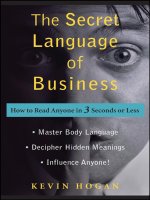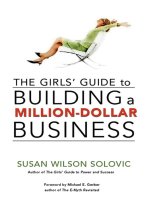The Secret to Winning a Start-up Competition
Bạn đang xem bản rút gọn của tài liệu. Xem và tải ngay bản đầy đủ của tài liệu tại đây (200.8 KB, 3 trang )
inc.com />The Secret to Winning a Start-up Competition
Christine Lagorio | Inc.com staff
Nov 20, 2012
Your PowerPoint is awesome (and memorized). Your pitch is crystal clear. You're adequately
caffeinated and totally pumped up. Here's why that's just not enough.
Courtesy Company
Former venture capitalist Ben Choi is CEO of CoffeeTable.
There's probably no higher concentration of former debate-team captains and Wharton MBAs
than at a San Francisco start-up competition. These events are full charming serial
entrepreneurs who can make even the clunkiest PowerPoint tolerable. They're great
networkers who tend to wear a perma-grin.
Ben Choi doesn't fit this mold. He speaks quietly, at a measured clip. He's never started a
company before, and he's never pitched at a start-up competition. But he knocked it out of the
park last week at San Francisco's Under the Radar conference, at which 27 companies pitched
their business ideas to panels of industry executives and investors.
Although Choi didn't have the slickest presentation and wasn't the best speaker, he did have
precisely what actually it takes to win: a why-didn't-I-think-of-that kind of business idea backed
by a solid business model. The product is called CoffeeTable, and it's a beautifully-designed
and simple-to-navigate app for viewing retail catalogs on an iPad. (As of this week, the app is
also available for the iPad Mini and iPhone.)
Here's what it looks like:
CoffeeTable has quickly become the No. 1 catalog app in the iTunes store. And the one-year-
old company has only raised one round of funding: $2.5 million from RR Donnelly, which is not a
VC firm but a 150-year-old $10 billion company that prints catalogs. (RR Donnelly is banking
that CoffeeTable will take it into the future.)
The CoffeeTable app is free to download. The company makes money by charging retailers
based on how often a catalog is opened, ostensibly to drive purchases through the app.
(Clicking on a product in the CoffeeTable catalog takes you to the corresponding product page
on the retailer's e-commerce site.)
"Retailers spend $15 billion a year printing and mailing catalogs, and most of those catalogs go
in the trash," Choi says. "In contrast, they pay CoffeeTable only when a shopper chooses to
open their catalog."
CoffeeTable is also working on analytics that will help retailers make more effective catalogs
digital or otherwise by tracking users' interactions with the electronic catalog pages.
Roughly $270 billion in retail sales is generated by catalogs, according to the American Catalog
Mailers Association. CoffeeTable has more than 170 retail partners, including Crate and Barrel,
Neiman Marcus, and West Elm. And with iPads expected to be in 40% of homes by 2016,
CoffeeTable targets a growth market.
When Choi stepped up to pitch his start-up to the Under the Radar conference, he noted these
sorts of statistics. He also showed a massive image of Angelina Jolie, along with a quote
recently attributed to her: "Brad and I were on Amazon.com for the first time a week ago. But
we got lost…I'll stick to catalogs."
Jolie, one of the highest-paid actresses in the world, isn't exactly a natural stand-in for an
everyday consumer, but the slide was a super-simple nod to a diversity of theories (paradox of
choice; digital divide; retail-as-therapy) that may explain why retail catalogs continue to be
browsed, hoarded, and even prominently displayed in homes. In other words, why print catalogs
still exist despite Amazon. And why it's not a far leap that they merge with the iDevice that
already sits next to the stack of them on your, well, coffee table.
Choi had tough competition. In his category, he went up against ShopAdvisor, a save-it-for-
later service that alerts consumers when an item they want to buy is available, or when it drops
to a certain price. It's already used by digital magazines, brand advertising, and media sites to
build in deferred shopping. The other two competing companies were Swarm, an in-store
smart-phone-based customer platform, and Best Decision, a social-recommendation engine for
retail items.
In the end, Choi's pitch won not only his category shopping but also took home the Judge's
Choice overall award for best company. His reaction was characteristically humble. "I'm not an
experienced public speaker, but I enjoyed it," says Choi. "It was a lot of fun to tell the story."
The Angelina bit went over particularly well, he says: "People laughed."
Christine Lagorio is a writer, editor, and reporter whose work has appeared in The
New York Times, The Washington Post, The San Francisco Chronicle, The Village
Voice, and The Believer, among other publications. She is executive editor of
Inc.com. @Lagorio









